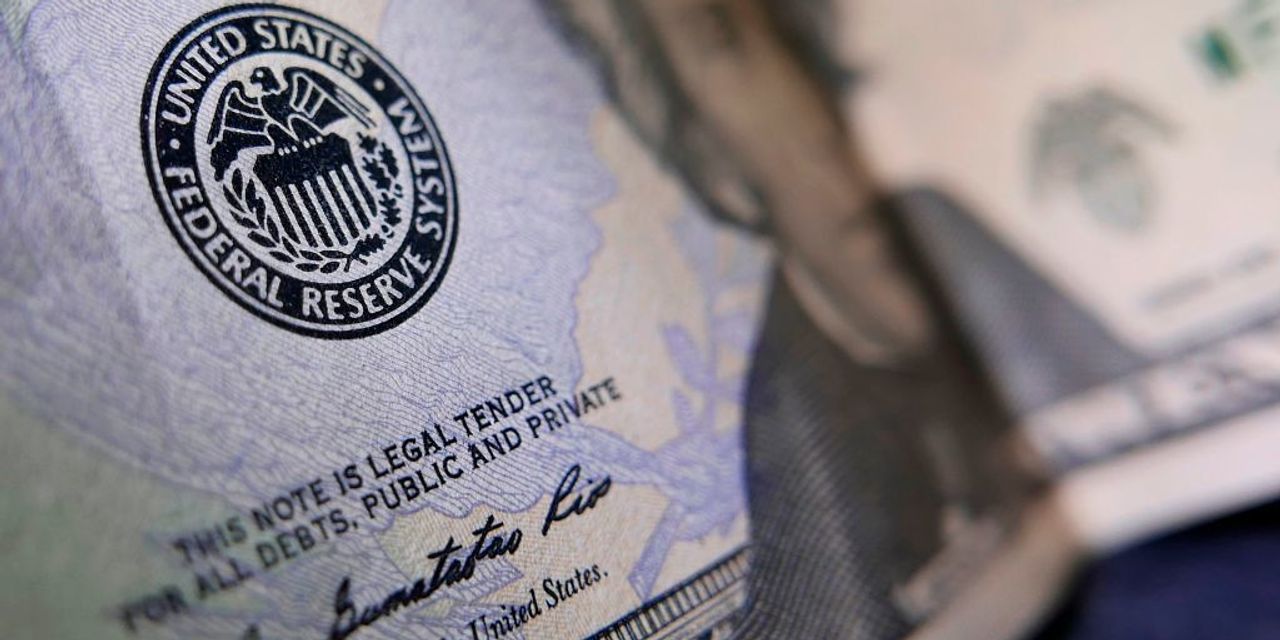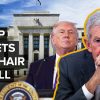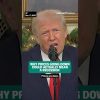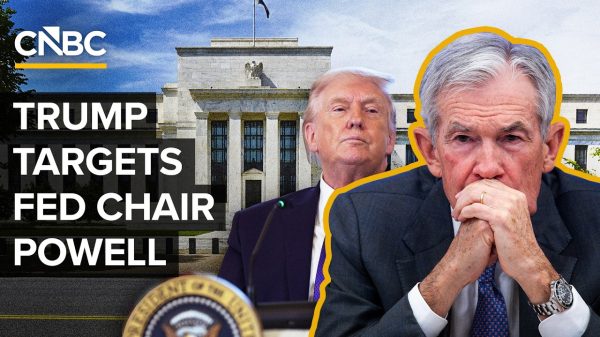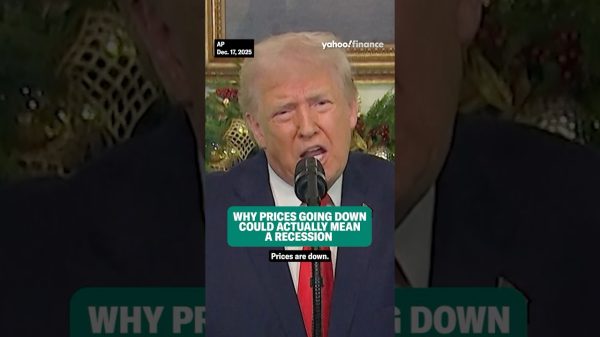Just hours after Federal Reserve Chairman Jerome Powell reassured the public that the U.S. banking system remains “sound and resilient,” another regional bank—PacWest Bancorp—was hurtling toward danger.
Shares in the Beverly Hills-based bank plunged as the company confirmed it was evaluating all options and was in discussions with partners and investors.
It’s been a tumultuous time for regional banks, what will it take for the phrase “sound and resilient” to be taken out of circulation once and for all?
The Fed is aware of, and monitoring, the potential economic consequences of the bank turmoil but the growing number of bank collapses doesn’t seem to be enough for it to change course. Powell closed the door on rate cuts anytime soon, although a pause is now largely expected in June.
The central bank’s monetary policy committee acknowledged that tighter credit conditions, as a result of the recent banking stress, are likely to hit households and businesses—weighing on economic activity, hiring, and inflation.
Perversely, that impact would actually help the Fed in its mission to bring down inflation. But the severity of the slowdown is still very much in the balance.
Powell thinks avoiding a recession is more likely than the prospect of one. Markets seem to disagree somewhat—pricing in a rate cut as early as September, according to CME’s FedWatch tool. That suggests expectations for a sharper downturn than the one predicted by the Fed.
Another key takeaway from the Fed’s meeting is the central bank is adopting a more data-dependent approach to whether further hikes are needed.
Friday’s jobs data take on greater importance now as investors look for more evidence that a pause is coming—and that a recession can be avoided.
—Callum Keown
*** Join Barron’s deputy editor Alex Eule and senior technology writer Tae Kim today at noon when they discuss the outlook for tech companies and individual stocks. Sign up here.
Try your hand at this morning’s Barron’s crossword puzzle and sudoku games. For all games, including a digital jigsaw based on the week’s cover story, click here.
***
Powell Hints Fed Might Be Nearly Done With Current Hikes
After Federal Reserve members unanimously voted to lift the bank’s benchmark interest rate by another quarter percentage-point, Fed Chairman Jerome Powell indicated they might be nearing a pause on further increases. It all depends on incoming data.
- “It’s possible that this time really is different,” Powell said. The Fed has raised rates a total of five percentage points since March 2022, the fastest pace of increases since the 1980s. But Powell noted the unemployment rate is 3.5%, lower than it was one year ago.
- Wednesday’s decision brought the fed-funds rate to 5.0% to 5.25%, the highest since autumn 2007. Fed officials would need to see data that points to stronger-than-expected growth, hiring, and inflation to raise rates again, The Wall Street Journal reported. The central bank’s next monetary policy meeting is June 13-14.
- The statement indicated the Fed believes it can continue its fight against inflation despite concerns about the banking system. Officials called the U.S. banking system “sound and resilient,” saying it is too early to know how much a potential lending pullback would affect the economy and inflation.
- Officials also removed a reference to “additional policy firming” in the future to get the annual inflation rate down to the bank’s 2% target. The Fed will continue selling Treasury- and mortgage-backed securities holdings as it works to shrink its multi-trillion-dollar balance sheet.
What’s Next: Powell warned about assuming the Fed can protect the economy from damage if the federal debt ceiling isn’t lifted. The Senate Budget Committee scheduled a hearing for Thursday to discuss a GOP plan to cut spending in exchange for raising or suspending the limit.
—Nicholas Jasinski and Janet H. Cho
***
Bank Moves to Calm Jitters, Says Deposits Are Rising
PacWest Bancorp
issued a statement aimed at reassuring markets about its health, saying deposits were rising. This followed the stock price of the Los Angeles-area lender sinking 55% in after-hours trading Wednesday.
-
The news hit just two days after
JPMorgan Chase
took over First Republic Bancorp after a tense weekend during which the Federal Deposit Insurance Corp. analyzed bids. - On Wednesday evening, the regional bank said deposits were rising. “The bank has not experienced out-of-the-ordinary deposit flows following the sale of First Republic Bank and other news,” It said.
- PacWest stock has been volatile since the March 8 failure of Silicon Valley Bank triggered a deposit run on some regional banks. Less than two weeks ago, PacWest reported noncash impairment charges that left a loss of $10.22 a share. Cash earnings were 66 cents a share.
- After substantial outflows of deposits, the bank planned to shrink its balance sheet by selling more than $3 billion of its loans. Bloomberg reported that the bank wasn’t having success marketing its loan portfolio.
What’s Next: PacWest shares are down 72% so far this year, bringing its market value to around $772 million. The stock fell 40% in Thursday’s premarket. Advisors including Piper Sandler and Stephens are helping PacWest evaluate longer-term plans for the business, CNBC reported.
—Liz Moyer and Rupert Steiner
***
Shell
Beats Estimates With Profit of Nearly $10 Billion
Shares of oil giant Shell were rising Thursday after the company reported first-quarter earnings that exceeded expectations and announced a new $4 billion buyback.
- The London-based major reported that earnings in the first three months of the year were $9.7 billion. That’s slightly lower than the fourth quarter, but substantially higher than the FactSet consensus of $8 billion. It also said it would complete a $4 billion buyback program over the coming three months.
- On Tuesday, rival BP also beat expectations, but shares fell as the company disappointed investors by slowing its buyback program.
- Shell, BP, and U.S. peers Exxon Mobil and Chevron all posted record profits in 2022, when oil prices spiked on the back of Russia’s invasion of Ukraine.
What’s Next: Oil prices are now more than 30% lower than this time a year ago. That suggests earnings are unlikely to be quite as high this year even if they’re still good by historical standards.
—Brian Swint
***
GSK Gets RSV Vaccine Nod, Lilly Highlights Alzheimer Drug
GSK
said the Food and Drug Administration approved its respiratory syncytial virus vaccine for adults aged 60 and older, the first treatment of its kind for the common and contagious illness. Rival
Pfizer
is awaiting approval for its RSV shot, which could happen in weeks, and vaccines for the same condition are in development at
Moderna
and
Bavarian Nordic.
- GSK will make doses available before the 2023-24 RSV season in the winter months. The cost hasn’t yet been disclosed but it could be from $65 to $185 a dose, The Wall Street Journal reported. Advisors to the Centers for Disease Control and Prevention are meeting about the drug in June.
-
Eli Lilly
said its Alzheimer’s drug donanemab significantly slowed cognitive decline by 35%, but three trial participants died after developing a condition associated with the treatment. Efficacy results seem likely to ensure the FDA will approve the drug. -
Safety data raise questions about whether Medicare will pay for the medicine, how eager doctors will be to prescribe it, and whether a rival treatment from
Biogen
and Eisai might seem more attractive to patients. Biogen and
Eisai
are waiting for an FDA decision on full approval. -
Elsewhere in the sector,
ImmunoGen’s
shares soared 136% after it reported “significant and clinically meaningful” survival results in a phase 3 trial of its drug Elahere among ovarian cancer patients. Elahere reduced the risk of death by 33% among patients with platinum-resistant ovarian cancer.
What’s Next: ImmunoGen said it plans to submit a marketing authorization application in Europe and a supplemental Biologics License Application in the U.S. in the second half of 2023 for a conversion to a regular approval of the drug.
—Janet H. Cho and Josh Nathan-Kazis
***
Apple Shareholders Await Earnings, News on This Year’s Payout
Apple
will report the last of the Big Tech earnings today after the market closes, with expectations for another year-over-year sales decline for the March quarter. But it is also expected to deliver a massive number for share buybacks and dividends.
- Apple usually updates its dividend and buyback policies in conjunction with its March quarter report. It added $90 billion to its buyback program in 2022 while increasing its quarterly dividend by 5%. Morgan Stanley’s Erik Woodring told MarketWatch the best bet is Apple makes the same move this year.
- It’s another way of demonstrating how much cash it generates each year. It has a balance of $165 billion in cash and marketable securities, though that doesn’t take into account debt. Net the debt, cash is around $54 billion.
-
Rival
Alphabet
just authorized a $70 billion buyback, an increase from 2022’s authorization for $50 billion. Apple is said to be working toward a “net cash neutral” position where its cash is equal to its debt. That’s when it could slow the pace of buybacks. - Wedbush analyst Dan Ives said an uptick in demand in China will help drive upside for iPhone sales. He said App Store activity could help Apple’s services revenue and allow the iPhone maker to at least meet expectations.
What’s Next: Though Apple hasn’t formally offered guidance since the Covid-19 pandemic started three years ago, the consensus among analysts polled by FactSet calls for earnings of $1.43 a share. Analysts expect sales to fall 4.5% to $92.91 billion.
—Liz Moyer and Connor Smith
***
—Newsletter edited by Liz Moyer, Patrick O’Donnell, Rupert Steiner
Read the full article here


